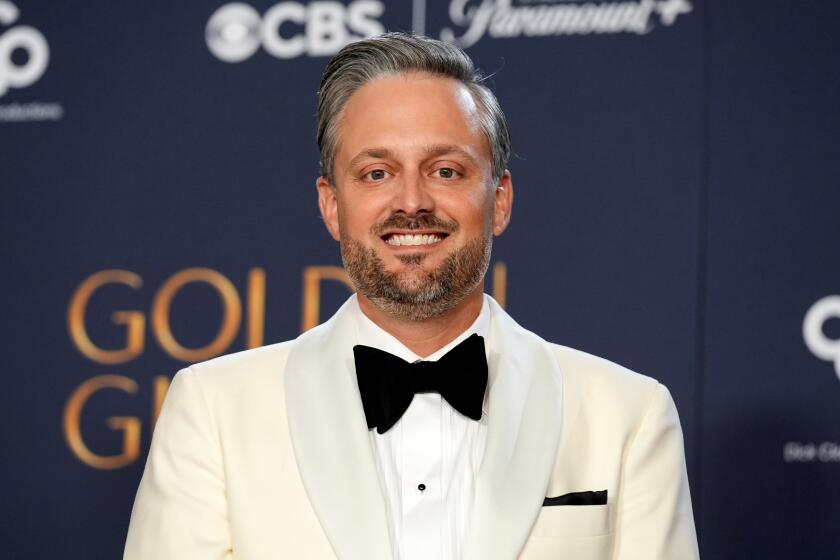Uplifting TV Role for Handicapped Actor : An Uplifting TV Role for Actor With Down’s Syndrome
- Share via
Chris Burke says he feels “very responsible” these days. The source of that responsibility is his new job--a highly coveted position as an actor in a new ABC prime-time series. But for Burke, who has Down’s syndrome, the job is especially meaningful.
“I’d like to be the role model to teach other people who have Down’s syndrome to be actors and actresses and to be themselves and not try to be a big shot,” he said.
Burke’s series, “Life Goes On,” premieres at 10 tonight before moving to its regular 7 p.m. Sunday slot. On the show, which focuses on a middle-class family of five, Burke, 24, plays Corky Thacher, an 18-year-old with Down’s syndrome who is being “mainstreamed” into the freshman class of a public high school.
Burke, who attended special schools and was not mainstreamed himself, said that he has spent his whole life wanting to be an actor, and also said that the attention that comes with being on TV is “really great.”
It would also be “really great,” Burke said, if his being on television helped other young people with Down’s syndrome (a genetic disorder caused by an extra 21st chromosome that results in varying degrees of mental retardation).
“I’d like to teach them about having responsibility. That they can do it,” he said.
Burke, for whom “Life Goes On” was created, candidly discussed his new television role while devouring one of his favorite meals--a large cheeseburger, fries and a huge hot-fudge sundae. While he didn’t ignore the fact that he had a disorder, he refused to dwell on it.
“I don’t really have Down’s syndrome; I just have a slight case of it,” he said early on in the interview. “I just want to be like other people that are normal.”
For instance, although the young actor described his 12-hour filming days as “very enjoyable,” there is one aspect he admitted to disliking. Burke said he feels he is treated differently from the other actors and that many things about the show are not explained to him.
“The director tells me, ‘Just pay attention to your own work,’ but I would like to be told more,” Burke said. “I don’t like to be different; I would like to be the same.”
Burke is aware, however, that his disability affects his acting. In fact, the hardest thing about his new job, he said, is how he feels when additional takes for some of his scenes are needed.
“I really hate to take up other people’s time. That’s very bad,” he said.
But while Burke may worry about stalling his co-workers, Michael Braverman, the show’s creator and executive producer, says nobody seems to mind.
“Both the cast and crew just love Chris, and they’re extremely patient,” Braverman said. “There’s no question it takes us longer, and it’s been much more difficult than we thought it would be. But the results are worth it.”
Braverman created “Life Goes On” specifically for Burke after producing an earlier pilot (that did not sell) in which Burke had a minor role as one of the lead character’s sons.
“Chris was a scene stealer. He was just terrific. So we said, ‘Isn’t there something we could do with Chris?’ ”
As it happened, ABC needed a family show, Braverman said, and “Life Goes On” was born.
“We had the actor, so it was just a question of tailoring (the show) to Chris and his limitations,” Braverman said. “We write specifically for him--we use simple sentences and we don’t give him large blocks of dialogue. We break up his scenes (so he doesn’t have too much to do at once), and we work with him on the set. If something’s difficult for him to say, we change it.”
In essence, Braverman said, Burke only has to be himself while playing the role of Corky.
“Chris is warm and charming, ingratiating, ingenuous. The actor and the role are very similar,” Braverman said.
Burke, who is very amiable and cracked a number of jokes throughout his interview, agreed. “Corky and I are really the same person together,” he said. “We both have a good relationship (with our families).”
When confronted with the idea that some people may not care to watch a show about a handicapped teen-ager, Braverman stressed that the series also focuses on the other members of the Thacher family (played by Bill Smitrovich, Patti LuPone, Kellie Martin and Monique Lanier). Besides, he says, “Life Goes On” is made to make people happy.
“Of course there will be some people who won’t watch it, but if people sample it and give it a chance, they’ll find out it’s not depressing at all,” he said. “It’s uplifting and good-humored. Our goal is to make people feel good.”
Burke has a different philosophy about how viewers will react to his role. “I think they will burst into tears and be proud of my performance,” he said.
One group that is already proud of Burke’s performance is the New York-based National Down Syndrome Society. Donna Rosenthal, the organization’s executive director, calls “Life Goes On” “an absolutely wonderful show. It’s terrific.”
“It really shows what a person with Down’s syndrome can do--that they can be a part of the community and grow and share,” Rosenthal said. “It shows how much people with Down’s syndrome can give to others. And most importantly, (it shows) that they’re human . We hope that many people will see that through the show.”
According to Rosenthal, “Life Goes On” is very realistic in its portrayal of Down’s syndrome issues. For instance, the issue of mainstreaming Down’s syndrome children into regular schools “is very real right now. And it’s only in the last couple of years that that’s begun to be addressed.”
Rosenthal added that a show like “Life Goes On” could not have been made years ago.
“In the last 10 to 15 years, we’ve been learning so much more about the capabilities (of Down’s syndrome people),” Rosenthal said. “Twenty years ago, people wouldn’t have believed that Christopher could have been an actor.”
But today, because of increased educational opportunities, she continued, “they’re becoming so much more a part of society. Even five or 10 years ago, there probably wouldn’t have been many people like Chris, of his age with his ability. Finding a Chris would have been very difficult.”
Rosenthal noted that Burke, who is rather handsome and not severely retarded, “is considered a very high-functioning young man for someone with Down’s syndrome . . . but he is not the only one (with such high capabilities).”
More to Read
The complete guide to home viewing
Get Screen Gab for everything about the TV shows and streaming movies everyone’s talking about.
You may occasionally receive promotional content from the Los Angeles Times.






